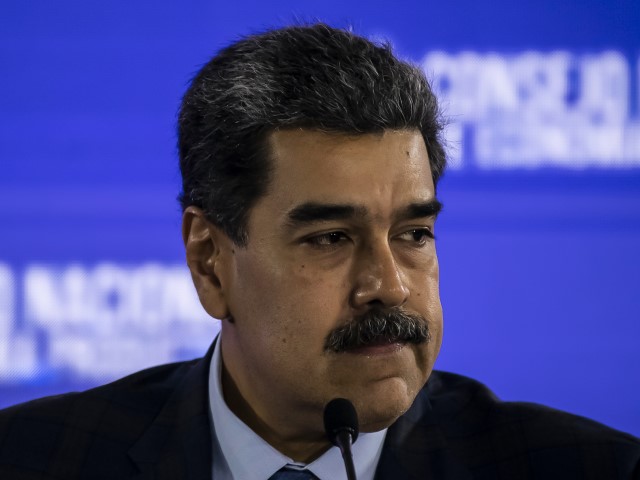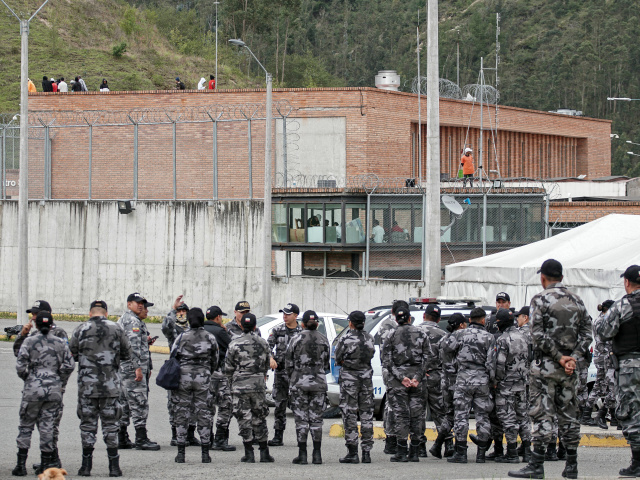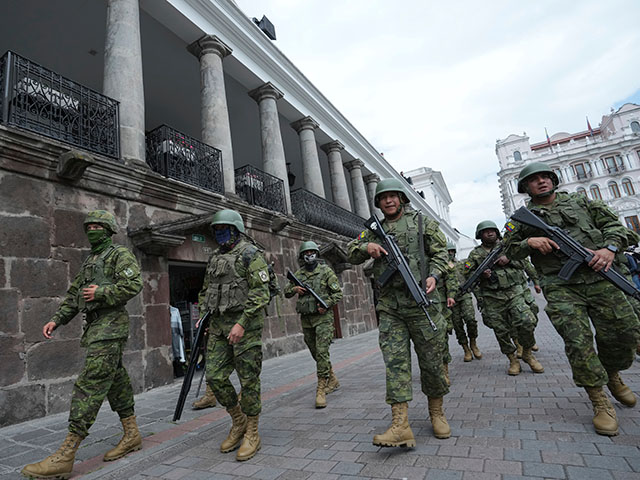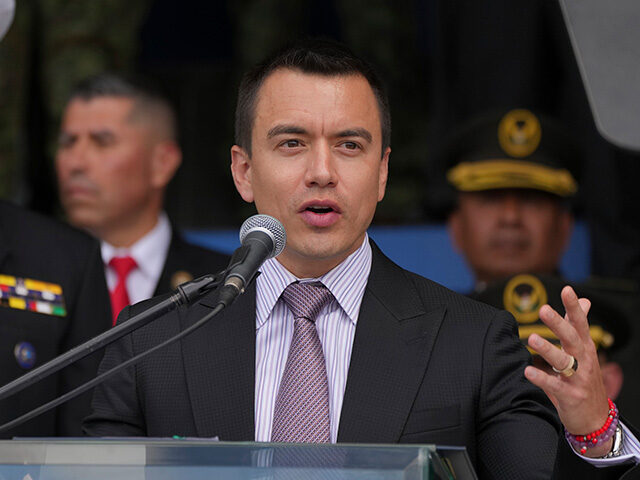President Daniel Noboa of Ecuador on Tuesday laughed off Venezuelan dictator Nicolas Maduro’s offer of security assistance against gang members, ignoring Maduro’s warning to steer clear of entanglements with the United States.
“Thank you, but no thank you,” Noboa said after Venezuela’s socialist strongman suggested asking for his help instead of accepting “interventionism” and “colonialism” from the U.S. Southern Command.

President of Venezuela Nicolas Maduro during a meeting at Humboldt Hotel on September 21, 2023, in Caracas, Venezuela. (Carlos Becerra/Getty)
“I don’t have a fight with Nicolas Maduro. I have enough fights here in this country,” Noboa added to the website interviewing him on Tuesday. “Simply no, thank you very much.”
Noboa was also humorously dismissive of domestic critics who said his anti-gang policies are little different from those of his predecessor, Guillermo Lasso.
“It is a good joke,” he said. “I think the vast majority of Ecuador has seen a big difference, so I leave that to the people to decide.”
Maduro piped up on Monday after Noboa met with U.S. representatives on Monday to discuss security cooperation. Noboa said he requested weapons, technology, and training from the U.S. for his security forces, and also hoped the U.S. would help him refinance Ecuador’s external debt, “so that we are not financially hanged while we fight this war.”

Police forces stand guard outside the Turi prison as inmates hold prison guards hostage, in Cuenca, Ecuador, on January 8, 2024. (Fernando MACHADO / AFP)
“I am addressing President Noboa with great respect: don’t open your country’s doors to the devil,” Maduro said over Venezuelan state television.
“The U.S. brings chaos wherever it comes,” Maduro railed, challenging Noboa to name one country where American intervention “helped stabilize the situation.”
Maduro claimed his regime “built peace” and “guaranteed security” without help from the U.S. Drug Enforcement Administration (DEA), which he boasted of having “expelled from our country.”
“There are two models: a Latin American model that we can build, and a model based on dependence and the intervention of the gringos, who come to seize a country’s wealth,” he said.
Noboa won the Ecuadorian presidency in October, overcoming his youth (he is only 36) and lack of political experience with a pledge to crack down on rampant drug cartel violence. He said his priority was to “rebuild a country that has been seriously hit by violence, corruption, and hatred.”
Another reason Noboa was able to rewrite Ecuador’s political script was that he ran for less than two years in office. Lasso bailed out during impeachment hearings, so the election covered only the remainder of his term. The previous darling of reform-minded Ecuadorians, Fernando Villavicencio, was murdered by cartel hitmen in August. Noboa wore a bulletproof vest when he went to the polls to vote for himself.
Noboa therefore took office under the assumption that he would have to dream big and work fast. The son of Ecuador’s richest man and heir to a banana empire, Noboa did not enter politics until 2021, when he won a seat in the National Assembly. He was educated in the United States, so it always seemed likely he would look for American help with Ecuador’s security crisis.

Soldiers patrol outside the government palace during a state of emergency in Quito, Ecuador, on January 9, 2024. (AP Photo/Dolores Ochoa)
Ecuador entered a state of emergency in early January after most-wanted cartel kingpin Adolfo Macias vanished from prison, sparking a string of ugly prison riots. The rioting inmates took prison staff hostage and boasted they were a “real mafia,” unlike the lightweights in El Salvador, where the once-mighty gangs were crushed by President Nayib Bukele.
Noboa’s administration said on Monday it has made considerable progress against gangsters during the state of emergency, shaving murders from 28 per day to six.
“In a matter of 40 days, more has been achieved than in two previous governments, which did not know how to do anything and cut Ecuador apart,” said Vice Minister of Governance Esteban Torres.
“We are at war, and managed to stop what was an avalanche of violence and destruction,” Noboa said on Monday.
On Wednesday, the Ecuadorian Constitutional Court ruled that two important agreements signed with the U.S. under the Lasso administration were valid without ratification by the National Assembly, paving the way for the close security coordination Noboa wants.
Among other provisions, the agreements allow the U.S. to exercise criminal jurisdiction in Ecuador, permit U.S. aircraft and ships to enter Ecuadorian waters, grant American forces access to Ecuador’s telecom infrastructure to coordinate their efforts, and extend legal protection to American personnel operating in Ecuador who are accused of misdeeds.

COMMENTS
Please let us know if you're having issues with commenting.